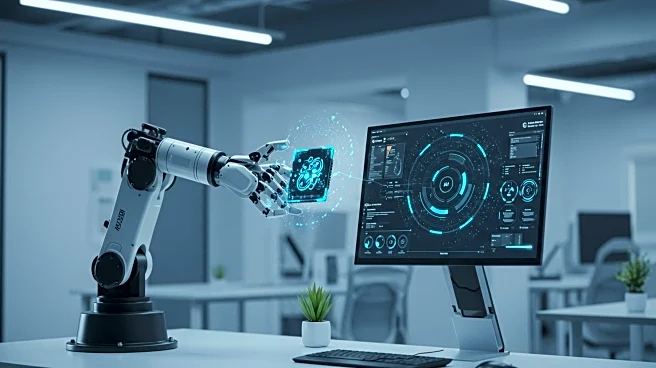What's Happening?
The discussion around artificial intelligence (AI) is shifting from a focus on automation to collaboration, as highlighted in a recent analysis. The article argues that while AI has the potential to automate many tasks, it is not yet capable of fully replacing human expertise in complex fields such as healthcare, law, and education. Instead, AI should be designed to work alongside professionals, enhancing their capabilities rather than attempting to replace them. This approach is exemplified by the use of AI in radiology, where tools like CheXpert have shown that collaboration between AI and human experts can lead to better outcomes than automation alone. The analysis suggests that AI should be developed as a collaborative tool that complements human skills, rather than as an automation tool that seeks to replace them.
Why It's Important?
The emphasis on AI collaboration over automation has significant implications for various industries. By focusing on collaboration, AI can enhance human expertise, leading to improved outcomes in fields that require complex decision-making and nuanced understanding. This approach can prevent the potential negative consequences of over-reliance on automation, such as the erosion of human skills and the risk of errors in high-stakes environments. Moreover, collaboration can help maintain the development of expertise in professions where experiential learning is crucial. As AI continues to evolve, its role as a collaborative partner can drive innovation and efficiency, benefiting both professionals and the industries they serve.
What's Next?
As AI technology advances, the focus on collaboration is expected to grow. Future AI tools are likely to be designed with collaboration in mind, enabling professionals to leverage AI's capabilities while maintaining their own expertise. This shift may lead to the development of new AI systems that are more transparent and interactive, allowing for real-time feedback and adjustment. Additionally, industries may need to adapt their training and development programs to ensure that professionals can effectively collaborate with AI, maximizing the benefits of this partnership. The ongoing evolution of AI will require careful consideration of how best to integrate it into professional workflows, balancing automation with human expertise.
Beyond the Headlines
The move towards AI collaboration raises important ethical and cultural questions. As AI becomes more integrated into professional fields, there will be a need to address issues of trust, transparency, and accountability. Ensuring that AI systems are designed to support human decision-making without undermining it will be crucial. Additionally, the cultural shift towards collaboration may require changes in how professionals view their roles and responsibilities, as well as how they interact with AI tools. These considerations will be essential in shaping the future of AI and its impact on society.








